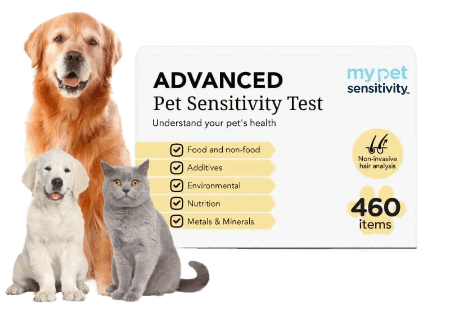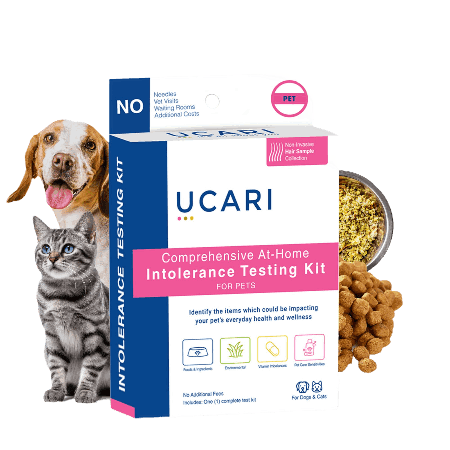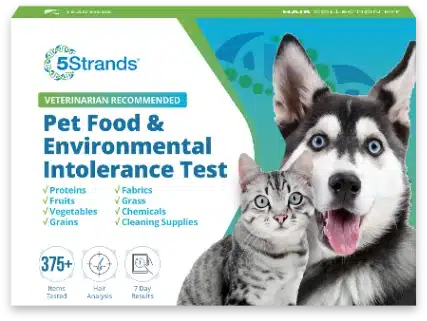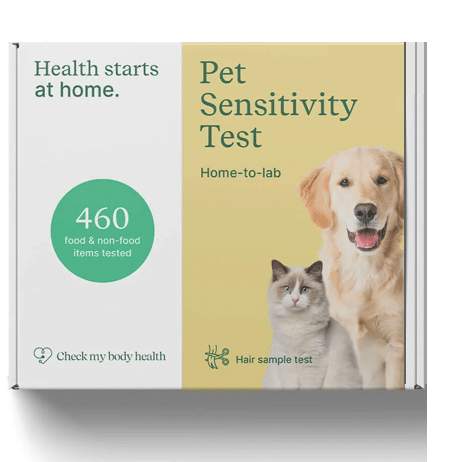
Reviewed by Dr. Joseph Menicucci, DVM, MBA. Veterinary Health Specialist and Diagnostic Expert.
* This content is for informational purposes and is not a substitute for professional veterinary advice.
If your pet shows any symptoms mentioned, promptly consult a veterinarian.
What are Digestive Problems?
Digestive problems in dogs encompass a range of issues affecting the gastrointestinal (GI) tract.
These can range from temporary upset stomachs to chronic conditions impacting their overall
well-being. Recognizing these problems early can be the key to swift recovery and less
discomfort for your furry friend.
How Can Dog Digestive Problems Be Prevented?
The Importance of Professional Insight
A veterinarian's expertise is invaluable in both treating and preventing digestive problems. They can offer personalized advice based on your dog's specific needs, ensuring that any underlying conditions are appropriately managed.
Preventative Measures to Minimize Dog Digestive Issues
- Balanced Diet: Ensure your dog is on a balanced diet appropriate for their age, size, and breed. Avoid sudden changes in diet to prevent digestive upset.
- Avoid Harmful Foods: Keep toxic foods like chocolate, grapes, onions, and certain nuts out of reach. Ensure they do not ingest household cleaners or other non-food items.
- Regular Exercise: Regular physical activity can help maintain healthy digestion and prevent obesity-related digestive issues.
- Stress Management: Identify and mitigate stressors in your dog's environment. This can include providing a calm environment, using anxiety wraps, or consulting a vet for anxiety management strategies.
- Hydration: Ensure your dog has access to clean, fresh water at all times to aid digestion and prevent dehydration.
- Routine Vet Visits: Regular check-ups can help catch and address potential digestive issues early. Your vet can also recommend specific preventative measures tailored to your dog.
- Fiber Intake: Incorporate sufficient fiber in your dog's diet through appropriate foods like oats and bran to prevent constipation.
The Role of Sensitivity and Intolerance Test Kits
Sensitivity and intolerance test kits emerge as a powerful tool in the fight against digestive issues. By revealing what triggers your dog's symptoms, these tests enable you to make informed decisions about their diet and environment. Whether it's switching to hypoallergenic food, avoiding certain plants in walks, or adjusting their bedding, small changes can lead to significant improvements in your dog's digestive health and overall quality of life.
Simplified Dog Sensitivity & Intolerance Detection Test Comparison Chart
← Swipe to Compare →
| Feature |

|

|

|

|

|
|---|---|---|---|---|---|
| Food Sensitivities ⓘ | 283 ingredients | 350+ | 103 ingredients | 275 ingredients | 236 ingredients |
| Environmental Allergens ⓘ | 127 items | 300+ items | 11 items | 105 items | 107 items |
| Non-Food Items ⓘ | 81 | 500+ | 12 | 105 | 58 |
| Test Focus ⓘ | Common Allergens | Extensive Intolerances | Food & Environmental | Food & Environmental | Broad Spectrum |
| Unique Feature ⓘ | Specialized in Common Allergens | Largest Number of Tests | Customized Food Recommendations | Nutritional Analysis | Combined Food & Non-Food Testing |
Symptoms of Digestive Problems in Dogs
- Diarrhea: Loose or watery stools can indicate an upset stomach or more serious conditions.
- Vomiting: Frequent throwing up can be a sign of toxicity, blockages, or infections.
- Loss of Appetite: A sudden disinterest in food might hint at nausea or abdominal pain.
- Abdominal Pain: Watch out for signs of discomfort, like whining or a hunched back.
- Flatulence: More than the occasional gas can suggest a dietary intolerance or imbalance.
- Constipation: Difficulty in passing stools can be as troubling as diarrhea.
Each symptom tells a story, hinting at what's happening inside. Diarrhea and vomiting purge the body of unwanted substances but can lead to dehydration. A loss of appetite or abdominal pain might discourage your dog from their usual playfulness, impacting their joy and energy levels. Flatulence, though often seen as harmless, can indicate digestive distress, while constipation adds discomfort, making every bathroom trip a struggle.
Causes of Digestive Problems in Dogs
- Food Allergies: Some dogs react badly to certain food ingredients, leading to various digestive issues.
- Parasites: Worms and other parasites can take residence in the GI tract, causing discomfort.
- Infections: Bacterial, viral, or fungal infections can upset your dog's digestive balance.
- Dietary Indiscretion: Eating garbage, toxic substances, or foreign objects can lead to serious problems.
- Stress: Anxiety and stress can manifest physically in your dog's digestive system.
- Chronic Diseases: Conditions like pancreatitis or inflammatory bowel disease can lead to persistent problems.
Understanding these causes is the first step towards addressing the root of the problem. Food allergies, for example, may require dietary adjustments, while parasites call for medical treatment. Stress-related issues might necessitate changes in your dog's environment or routine to restore their inner peace.
Diagnosis of Digestive Problems in Dogs
Diagnosing the exact cause of digestive troubles requires professional insight. Veterinarians use a combination of medical history, physical examinations, and diagnostic tests like blood work, ultrasounds, or x-rays to pinpoint the issue. They might also recommend dietary trials or fecal examinations to rule out allergies or parasites. Additionally, dog sensitivity and intolerance test kits can be used to identify specific food intolerances or environmental sensitivities, offering a convenient and comprehensive way to tailor your dog's diet and care for optimal health.
Effective Treatment Options for Dog Digestive Problems
- Consulting Your Vet: It's crucial to consult with your veterinarian before making any changes to your dog's diet or treatment plan. A vet’s guidance ensures that any interventions are safe and appropriate for your pet's specific condition.
- Dietary Adjustments: Adjusting your dog's diet is often the first step in managing digestive issues. This may include switching to a high-quality, easily digestible food, or a prescription diet recommended by your vet.
- Medications: Depending on the diagnosis, your vet might prescribe medications such as antibiotics, anti-inflammatory drugs, or probiotics to address infections, inflammation, or imbalances in the gut flora.
- Surgical Intervention: In severe cases, such as when there is an obstruction or a significant issue in the digestive tract, surgical intervention might be necessary to remove the blockage or correct the problem.
Top Dog Sensitivity & Intolerance Detection Testing Kits
Most sensitive: My Pet Sensitivity

My Pet Sensitivity: Comprehensive Sensitivity Testing for Pets
- Sensitivity & Intolerance Test: Screens for 300+ items.
- Environmental Sensitivities: Identifies potential triggers from the environment.
- Nutritional Imbalances: Detects deficiencies in vitamins and minerals.
- Non-Invasive: Uses hair samples for testing.
- Detailed Report: Provides a comprehensive breakdown of sensitivities.
My Pet Sensitivity stands out with its commitment to understanding the unique sensitivities of pets. Their tests analyze over 460 common food ingredients and environmental factors, providing a holistic view of what might be causing discomfort to pets. The process is straightforward: register the test, collect a small fur sample, send it in, and receive detailed results within five days of the sample reaching their facility. Their brand story emphasizes the deep bond between pets and their owners, and their goal is to enhance the quality of life for both. With a range of tests tailored for different pets, including dogs, cats, puppies, and kittens, My Pet Sensitivity is dedicated to ensuring the best health and well-being for our furry companions.
Most Thorough Detection – UCARI

UCARI : Uncovering Your Pet's Unique Needs
- Sensitivity Expertise: UCARI's precise intolerance detection.
- Intolerance Insights: In-depth, easy-to-understand profiles.
- Simple Collection: Quick hair sample kit.
- Rapid Results: Online in two days..
- Complete Health View: Detailed pet sensitivity analysis.
UCARI offers a unique, non-invasive pet test that uses a simple hair sample to identify potential food and non-food intolerances, imbalances, and sensitivities in pets. This test covers over 1000+ potential issues, providing pet owners with easy-to-understand, color-coded personal charts detailing their pet's intolerances ranked from highest to lowest. The results, which are broken down into categories like food, environmental factors, skin care ingredient sensitivities, and nutritional imbalances, offer actionable insights for a nutritional reboot.
Widest Variety of Quality Products: Chewy

Chewy: Your One-Stop Shop for Leading Pet DNA and Allergy Testing Kits
- Pinpoint the cause of your dog's discomfort: Over 120 Allergens Tested
- Custom Food Recommendations: Tailored advice based on detected allergies.
- Easy Swab Process: Simple, user-friendly testing.
- Results in 7 Days: Quick turnaround for peace of mind.
- Comprehensive Sensitivity Overview: Understand your dog's environmental and food sensitivities.
Chewy stands as a leading and established name in the pet industry, renowned for its extensive range of pet products, including an impressive selection of the best dog DNA and allergy tests from top companies. With a commitment to providing exceptional customer service, Chewy has earned the trust and loyalty of millions of satisfied customers worldwide. Their platform offers a curated collection of DNA and allergy tests, enabling pet owners to gain valuable insights into their pets' breed, health, and potential sensitivities with ease and accuracy. Chewy's dedication to quality, reliability, and customer satisfaction has solidified its reputation as a go-to destination for pet owners seeking the best products and services for their furry family members.
Most Extensive Range Of Tests: 5Strands

5Strands: Comprehensive Intolerance Detection
- Affordable Testing: budget-friendly intolerance tests.
- Extensive Screening: 300+ food and environmental items.
- Non-Invasive: Uses hair samples for testing.
- Fast Results: Delivers results within 5-7 days.
- Detailed Report: Provides a comprehensive report with a level of intolerance.
5Strands takes a holistic approach to pet health, emphasizing the intricate relationship between your pet and its environment. Their testing method demands a full commitment, which might sometimes require a shift from processed pet food to home-cooked meals or a raw diet. This ensures a more accurate detection of allergens that could be affecting your pet's well-being.
Fastest Results: CheckMyBodyHealth

CheckMyBodyHealth: Pioneering Pet Sensitivity Analysis
- Holistic Health Testing: Offers tests for both pets and humans.
- Extensive Sensitivity Analysis: Covers 300+ food and non-food items.
- Easy Sample Collection: Uses a simple hair sample.
- Fast Turnaround: Delivers results within 7-10 days.
- Customer-Centric Approach: Emphasizes customer satisfaction.
CheckMyBodyHealth offers a unique approach to pet sensitivity testing. Unlike many other services, there's no physical kit sent out. Instead, pet owners are guided through a seamless process where they send in their pet's hair or fur sample. This method ensures a hassle-free experience for the pet and the owner. Once the sample is received, results are delivered within a mere three working days, making it one of the fastest turnaround times in the industry. The test is comprehensive, analyzing sensitivities to a vast array of potential irritants. Their commitment to efficiency and accuracy makes CheckMyBodyHealth a top choice for those seeking insights into their pet's sensitivities.
Allergies vs. Sensitivities and Intolerances
Distinguishing between allergies, sensitivities, and intolerances is crucial for your dog’s health. Each condition affects your dog differently and requires unique management and treatment.
Allergies
Allergies in dogs involve an immune system response to an allergen, usually a protein. Symptoms include itching, inflamed skin, vomiting, and diarrhea. Allergies are less common but more severe due to immune involvement. They can also be triggered by environmental factors like pollen and mold.
Remember, allergy testing is a veterinarian’s task.
Sensitivities and Intolerances
Sensitivities and intolerances do not involve the immune system. They are generally related to the digestive system's inability to process certain foods, causing symptoms like loose stools, gas, and stomach pain. These conditions are common and often confused with allergies.
Why the Confusion?
Many pet owners mistakenly seek allergy tests for conditions that are actually sensitivities or intolerances. We use the term “allergy test” to guide owners to the appropriate tests. However, diagnosing allergies is a veterinarian's job. Always consult a vet for accurate diagnosis and treatment.
FAQs
Are some dog breeds more prone to digestive issues than others?
Yes, some breeds have genetic predispositions to certain conditions, but digestive problems can affect any dog.
How can I tell if my dog's digestive issues are serious?
Persistent symptoms, blood in vomit or stools, or a sudden change in behavior warrant immediate veterinary attention.
Can human food cause digestive problems in dogs?
Absolutely. Many human foods are toxic to dogs and can lead to severe digestive issues.
How accurate are sensitivity and intolerance test kits?
These test kits can be very accurate in identifying specific triggers affecting your dog’s health, helping you to tailor their environment and diet accordingly.
How does a dog allergy test work?
These tests typically use bioresonance technology or other methods to analyze a sample (hair or saliva) from your dog. The sample is compared against a database of various substances to identify potential intolerances or sensitivities.
What can a dog allergy test detect?
Dog allergy tests can detect sensitivities and intolerances to a wide range of substances, including various types of food ingredients, environmental factors, and potentially harmful materials in skincare products.
Why should I consider an allergy test for my dog?
An allergy test can be helpful if your dog is experiencing symptoms like hot spots, itchy skin, digestive disturbances, vomiting, or flatulence, and you are unable to determine the cause. It can also be used proactively to understand potential intolerances your dog might have.
Is the test suitable for all dogs?
Yes, these tests are generally suitable for all breeds and sizes of dogs. Some tests are also suitable for cats.
A Loving Reminder
The information provided at ThePetPicks.com is based on research and expertise, aiming to enhance the bond between you and your dog. However, it’s essential to remember that every dog is unique. Always consult with professionals, like veterinarians or trainers, for specific concerns or advice. At ThePetPicks.com, we believe in “Trust Born from Love,” and we encourage every pet parent to make informed decisions rooted in love and care.

